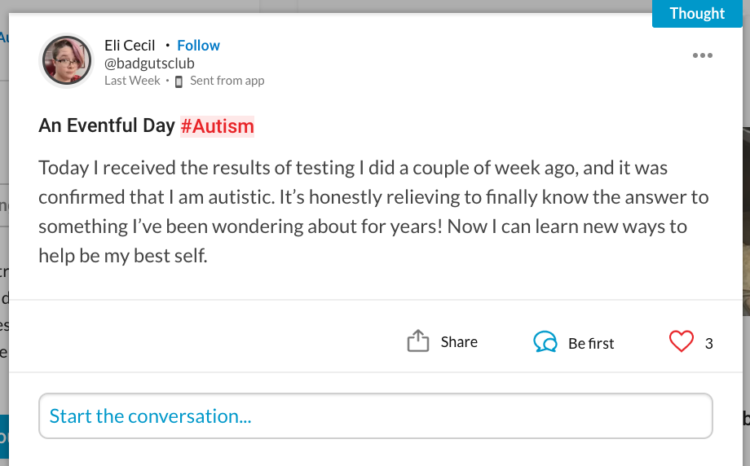As a Mom of a Child With Autism, I Say BS to Functioning Labels
I could feel her emotions in a text. Not because she included 32 different emojis — that let me know exactly the range of emotions a visit from her autistic son’s caseworker to her home made her feel. Not because her text was in all shouty CAPITALS. And not because I was sitting across the room from her and could hear how hard her fingers were tapping on her phone screen. No, I knew what she was feeling because I’ve felt it, too. I’m betting you may have as well.
The caseworker is required to stop by every six months to make sure my friend’s son still qualifies for services. Services that were initially started based on the score of an IQ test created by a neurotypical, verbal human a bazillion years ago. The range of emotions that come when someone, some stranger, some “expert” puts a check next to a box that they believe your son or daughter fits in, well, you don’t need emojis or shouty capitals to know the range of feelings that box evokes.
My friend’s son and my son both have autism. How autism impacts their lives is different in some ways and similar in others. First and foremost, they are both incredible human beings. Incredible. My son, however, is verbal and considered “high functioning” and my friend’s son is nonverbal and most would consider “low functioning,” which is where this boy and his mother both cry bullshit. And from a mom whose son may seem “better off,” I cry bullshit too.
I know we put people in categories for various reasons, mostly so we can sort them out, get a picture of who they are, what they do, where they came from, how they self-identify and who they love by checking a box under categories for items like race, gender, sexual orientation, ethnicity, occupation, etc. But trying to group a human being by their level of functioning is so ambiguous, so subjective and so unfair — and thus so goal limiting — it is downright ludicrous. We cannot sort out and put humans in a category, a box, if we don’t even know how or what to ask to determine who they are, how they think, and where they “belong.” If we have yet to accurately sort out how their brain functions, how can we sort their brain functioning into a pre-determined, categorized box?
How are we to know my friend’s son’s functioning level when we have yet to ascertain how his incredibly beautiful mind works? And if a boy is so extraordinarily in tune with his senses, his surroundings and his people, how can we not see that as “high functioning”? To ask someone who is nonverbal and unable to communicate as society expects to answer questions on a survey or on an IQ test designed for people who are verbal and who process information the same way as the survey designer — just so we can fit them into some predetermined box — of course society will not deem this young boy’s functioning level on par with those who can communicate verbally or who score a certain level on an IQ test. We may not have found the box my friend’s son belongs in, because there is no one size fits all box. And if a person is told, “I’m sorry we have not yet found the right box for you, so we will just stick you in this box with others who are kind of like you,” how will that individual ever believe there is a different box, a better box, a more fitting box he or she belongs in? I say “bullshit.”
Connect with people in the autism community. Join in the conversation below.
And for my son who is “high functioning,” that puts him in a box he doesn’t always fit in either. Sure, he can do trigonometry and write a beautiful essay on a poem he read, but he still struggles with social nuances, social communication, disrupted routines and vague language. But because he is placed in the predetermined “high functioning” box (by neurotypical people who process information and define intelligence by a set of questions and answers), when my son doesn’t perform well in areas where he struggles, he is deemed lazy, uncaring or disingenuous and I cry “bullshit” again.
I know that we will always have a need, a desire to understand humans by categorizing them, labeling them and finding where they fit. But we have to do better for those who don’t “fit” in our preconceived ideas of intelligence or functionality.
We’ve got to stop trying to put individuals in a functionality box until we explore every avenue of the various ways humans function. This is my step to get others who believe this to advocate for yourself, your child, your adult son or daughter. This is me asking people to listen. Please.
After the caseworker checked the box where she believed my friend’s son fit, my friend looked at her son and told him this:
“That test means nothing and you are the smartest boy I know and my hero, which makes you extra awesome.”
In other words, she cried “bullshit.”
Getty image by hjalmeida


